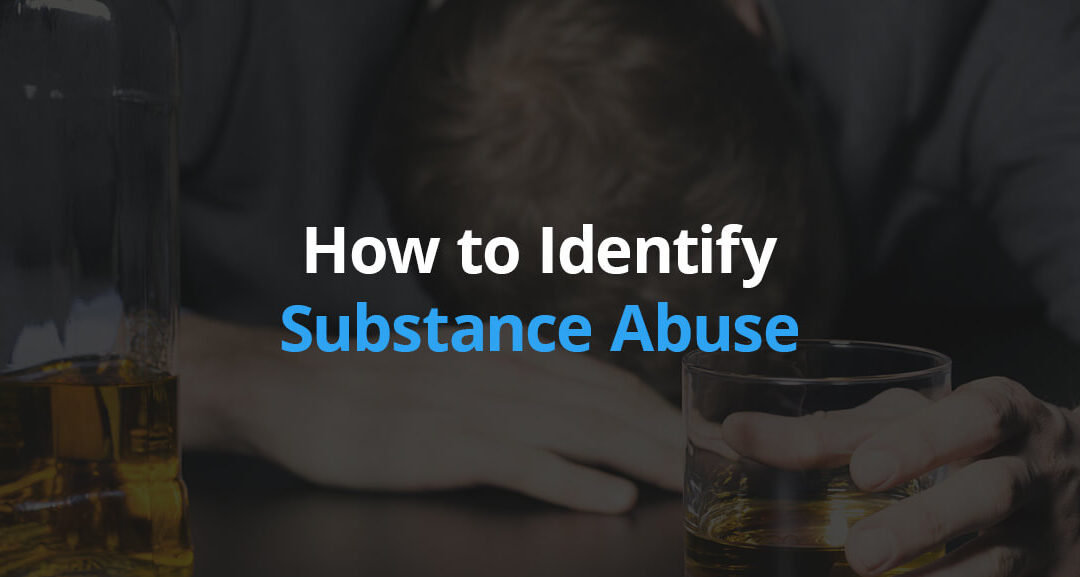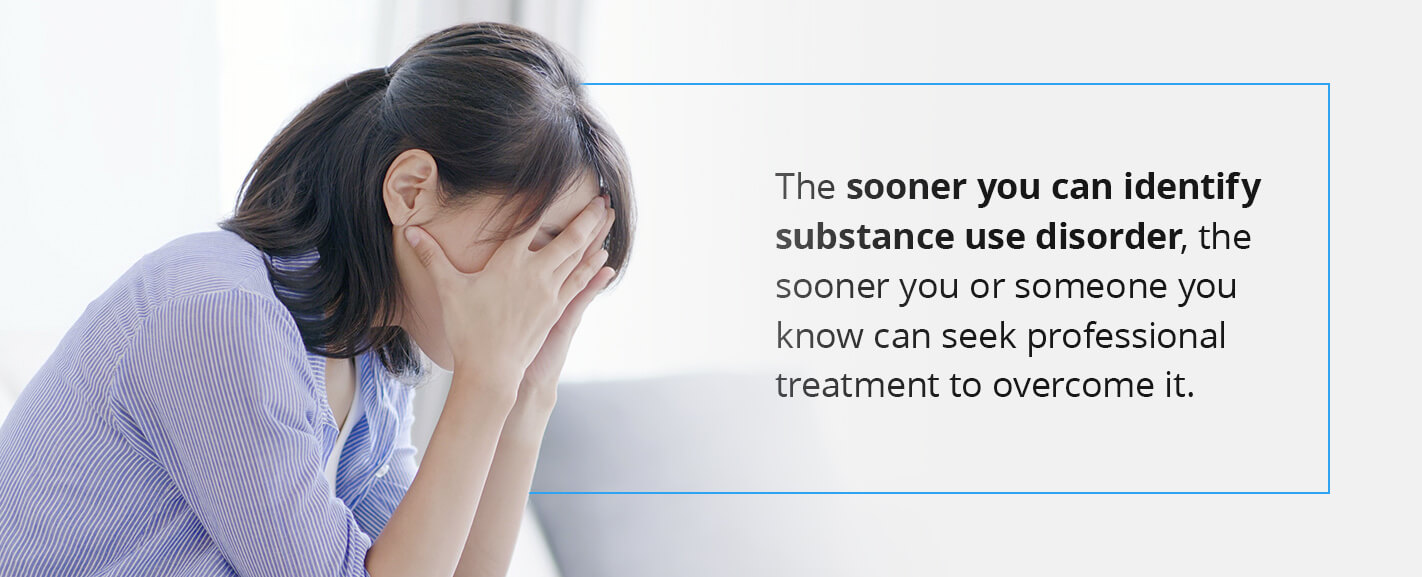Substance use disorder is a condition that can drastically affect one’s livelihood, from mental and physical health to interpersonal relationships. The disease affects over 20 million Americans, coming in various forms, including opioid and alcohol addiction and benzodiazepine misuse.
While complex and chronic, substance use disorder is treatable. If you’re worried about yourself or a loved one’s substance use, it’s helpful to know the warning signs of drug use and addiction. Learn how to know if you have substance use disorder and how professionals can help.
What Is Substance Use Disorder?
Substance use disorder is defined by a pattern of distress from consistent drug or alcohol use. Addiction can affect work, daily functions or relationships, and it is associated with both legal and illegal substances. Illegal substances include heroin and cocaine, while legal substances include alcohol, prescription drugs and nicotine. Some substances like marijuana have different legal statuses in different states. In Massachusetts, for instance, cannabis is legal for recreational use, though there are restrictions.
With substance use disorder, a person must constantly increase the drug to get the desired effect, which can cause a pattern of misuse. If someone dependent on substances decides to decrease use, uncomfortable and sometimes dangerous withdrawal symptoms often occur. While these symptoms vary depending on the person, the type of substance and the frequency it was taken, common effects include irritability, nausea, insomnia, depression, mood swings, achiness and cravings.
Several factors can contribute to a person developing addiction, including environmental stressors, personality, social pressures, genetic makeup and mental health conditions. While the condition is complex, it’s also treatable through inpatient or outpatient intervention. Mental health professionals can diagnose the condition and provide therapy to help clients recover.
Types of Substance Use Disorders
There are different types of drug dependency that can affect a person and cause them to develop an addiction. These include:
- Alcohol dependence: Alcohol is one of the most commonly misused substances worldwide. It affects several of the body’s basic functions and can impact a person’s perception, judgment and response reactions. Liquor, beer and wine are all types of alcoholic substances people can become addicted to.
- Opioid dependence: Opioids, such as oxycodone and heroin, are commonly misused substances. These drugs are created from opium or a synthetic version of the drug. Opioids interact with neurotransmitters and block signals, making them strong painkillers. They also create feelings of euphoria that make them highly addictive.
- Sedative dependence: This category includes benzodiazepines and barbiturates. Both are often prescribed for sleep and psychiatric conditions and highly addictive. Benzodiazepines include Xanax, Ativan and Valium, while barbiturates can include Luminal or Amytal.
- Cannabis dependence: Cannabinoids are drugs with the chemical compound tetrahydrocannabinol (THC), the active component in marijuana. These compounds produce euphoric feelings while negatively impacting physical and mental functioning.
- Hallucinogen dependence: Mushrooms and LSD are hallucinogens. These drugs can change a person’s thought perceptions and sense of reality when taken. While hallucinogens have a lower risk of addiction and overdose, the mental effects can be long-lasting or permanent when taken frequently or in large quantities.
- Stimulant dependence: Stimulants include cocaine, a drug that directly affects the brain, often leading to tolerance and addiction. As higher doses are needed more frequently, the brain develops a dependence while requiring more of the drug to get the same euphoric feelings initially received.
Signs of Substance Abuse
Warning signs of substance use disorder can be tricky to identify in yourself or a loved one in the beginning stages of the condition. It’s also common for people with addiction to downplay their problem or attempt to hide it from others.
However, there are distinct physical, psychological and behavioral signs of addiction you can look for reasonably early, often affected by the type of dependence. The sooner you can identify substance use disorder, the sooner you or someone you know can seek professional treatment to overcome it.
Physical Warning Signs of Addiction
When identifying a substance use problem, it helps to look for the following common physical signs of drug use, such as:
- Bloodshot eyes
- Larger or smaller pupils than normal
- Tremors
- Slurred speech
- Impaired coordination
- Sudden weight loss or weight gain
- Changes in appetite or sleep patterns
- Deterioration of physical appearance and personal grooming habits
- Runny nose or sniffling
- Unusual smells on breath, body or clothing
For example, someone with opioid addiction might have contracted pupils, sleep at unusual times or have needle marks on their body. People with a cocaine or methamphetamine addiction commonly go long periods without sleeping or eating and experience excessive weight loss.
Behavioral Signs of Addiction
There are several behavioral warning signs of substance use disorder, including:
- Drop in attendance and performance at work or school
- Secretive or deceptive behaviors
- Sudden changes in friend groups, favorite hangout spots and hobbies
- Avoiding situations or people
- Risk-taking, such as driving while under the influence or having unprotected sex
- Neglecting responsibilities at school, work or home
- Legal trouble, such as arrests for disorderly conduct
- Relationship and financial difficulties
- Unexplained need for money
- Borrowing or stealing money
- Misusing drugs to avoid or relieve withdrawal symptoms like insomnia, nausea or anxiety
- Using more drugs than intended and an inability to stop
- Constantly thinking about how to obtain more drugs or recover from use
- Setting aside once previously enjoyed hobbies to use drugs
- Continuing to take drugs regardless of negative consequences
Behavioral signs of alcohol addiction include underage or binge drinking, displaying anger when questioned about drinking patterns and making excuses to continue drinking at inappropriate times or places. People with a hallucinogenic drug dependence may display irrational behavior, such as paranoia or aggression.
Psychological Warning Signs of Substance Use Disorder
And lastly, someone with substance use disorder might display these psychological signs:
- Unexplainable change in personality or attitude
- Periods of depression
- Seeming tired or out of it
- Sudden mood swings or angry outbursts
- Fearfulness or anxiety
- A lack of motivation
- Unusually increased energy
- Irritability
For instance, someone with stimulant dependence might appear hyperactive or experience frequent mood swings, appearing happy and euphoric one minute to angry or deeply depressed the next.
Contact MV Psych for Support in Andover, MA
Recognizing a substance use problem is the first step to recovery. If you or a loved one is worried you may have substance use disorder, Merrimack Valley Psychological Associates can help.
At our treatment center, we can evaluate your substance use disorder and get you started on a custom path to recovery. Our mental health professionals can provide the support and care you need to recover. No matter the type of dependence you’re facing, we offer the help you need to build a satisfying, drug-free life for yourself.
To learn more about our addiction counseling, contact us and schedule an appointment.



